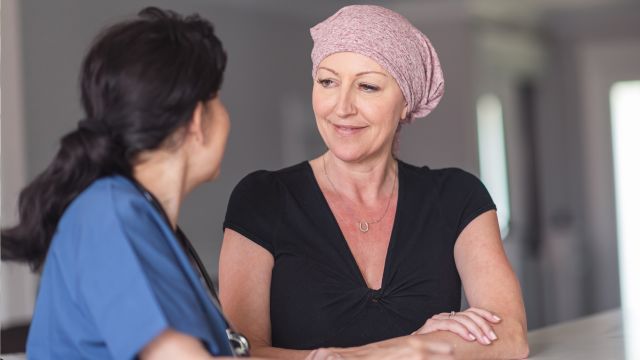For women diagnosed with the most common type of early-stage breast cancer, there’s a bit of good news from the 2018 American Society of Clinical Oncology annual meeting. A new clinical trial found that many of these patients may be able to safely skip chemotherapy and just receive hormone therapy to treat their disease.
In a nutshell, the study found that the majority of women diagnosed with hormone receptor-positive, HER2-negative, axillary lymph node-negative breast cancer may fare just as well with hormone therapy alone after surgery as they would with hormone therapy combined with chemotherapy.
Here’s what you need to know.
Breast cancer diagnosis basics
When a woman is diagnosed with breast cancer, her oncologist runs tests on the tumor to learn more about it, such as how fast it might grow, how likely it is to spread or recur and whether certain types of treatment are likely to be effective.
About half of all cases of breast cancer in the U.S. are known as hormone receptor (HR)-positive, HER2- negative and axillary node-negative. This long label describes some of the key features of this type of breast cancer. HR-positive means that when the hormones estrogen or progesterone attach to cells on the tumor, they cause it to grow. HER2-negative cancers do not respond to treatments with drugs that target proteins on breast cells called human epidermal growth factor receptors. Axillary node-negative means the cancer has not spread into the lymph nodes.
Oncologists also conduct genetic tests. One of these tests, called the 21-gene expression test, looks at how likely the cancer is to come back, or recur. The chance of cancer recurrence is scored on scale from 0 to 100. Cancers with scores of 10 or less are not very likely to recur; those above 26 have a higher likelihood of recurring.
All of this data drives treatment decisions. Women with HR-positive, HER2-negative, axillary node-negative breast cancer and a recurrence score of 10 or less typically receive hormone therapy (also known as endocrine therapy), which works by lowering estrogen levels in the body or blocking estrogen from affecting breast cancer cells. Patients with higher scores have generally received hormone therapy plus chemotherapy.
New research may change treatment protocol
The new study, dubbed the Trial Assigning Individualized Options for Treatment (TAILORx), is a randomized, phase III clinical trial that enrolled 10,273 women between the ages of 18 and 75 with HR-positive, HER2-negative, axillary node-negative breast cancer from several countries.
Women in the study with low recurrence scores (10 or less) received hormone therapy alone. Those with high recurrence scores (26 or higher) received hormone therapy plus chemotherapy. Those with intermediate risk scores (11 to 25) were randomly assigned to receive hormone therapy alone or hormone therapy with chemotherapy to determine if there was a benefit to receiving chemotherapy.
Turns out, there wasn’t.
Five years after treatment, those patients who received hormone therapy alone had a disease-free survival rate of 92.8 percent; the corresponding number for those who also received chemotherapy was 93.1 percent. At nine years, those numbers were 83.3 percent for those receiving hormone therapy alone and 84.3 percent for hormone therapy plus chemo. The differences for both five and nine years were not considered statistically significant.
There was one caveat: women 50 or younger with a recurrence score of 16 to 25 were slightly more likely to benefit from the additional chemotherapy.
What does this mean for patients?
According to the study, which was published in the The New England Journal of Medicine, using the 21-gene test can help identify women with early stage breast cancer and a moderate risk of recurrence who can safely skip chemotherapy.
In a press release issued by the National Cancer Institute (NCI), which supported TAILORx, Jeffrey Abrams, MD, associate director of NCI's Cancer Therapy Evaluation Program, explained, “Until now, we've been able to recommend treatment for women with these cancers at high and low risk of recurrence, but women at intermediate risk have been uncertain about the appropriate strategy to take."
The new findings, which showed no benefit from receiving chemotherapy plus hormone therapy for most patients in this intermediate-risk group, according to Dr. Abrams, “will go a long way to support oncologists and patients in decisions about the best course of treatment."
Lead study author Joseph A. Sparano, MD, associate director for clinical research at the Albert Einstein Cancer Center and Montefiore Health System in New York City, also noted in the release:
"The new results from TAILORx give clinicians high-quality data to inform personalized treatment recommendations for women. These data confirm that using a 21-gene expression test to assess the risk of cancer recurrence can spare women unnecessary treatment if the test indicates that chemotherapy is not likely to provide benefit."
If you’ve recently been diagnosed with HR-positive, HER2-negative, axillary node-negative breast cancer, the first step is to make sure that your disease is being treated effectively. You may also ask your doctor about whether using the 21-gene expression test may be right for you.
If your risk of recurrence falls within that intermediate level, it may be worth considering whether the downsides of chemotherapy—which may include side effects such as nausea, hair loss, fatigue, neuropathy, and, in rare cases, heart failure and leukemia—may outweigh the potential benefit.






